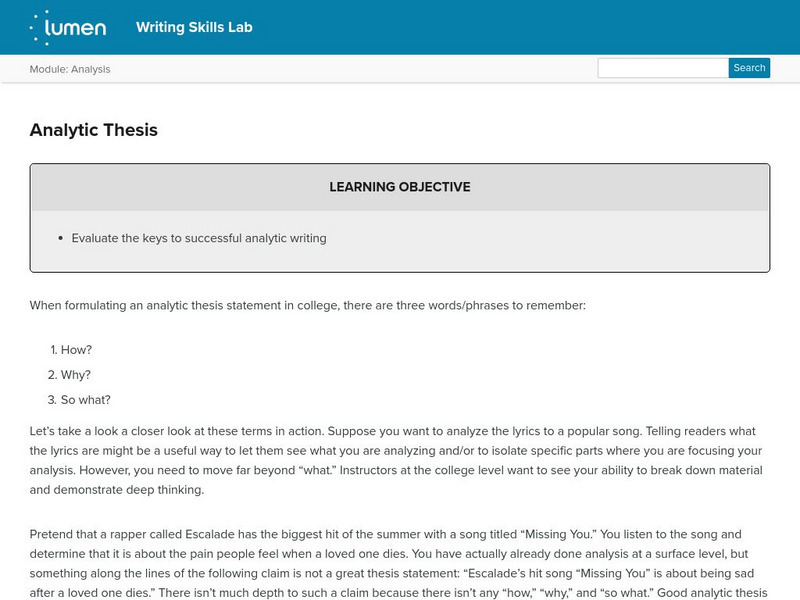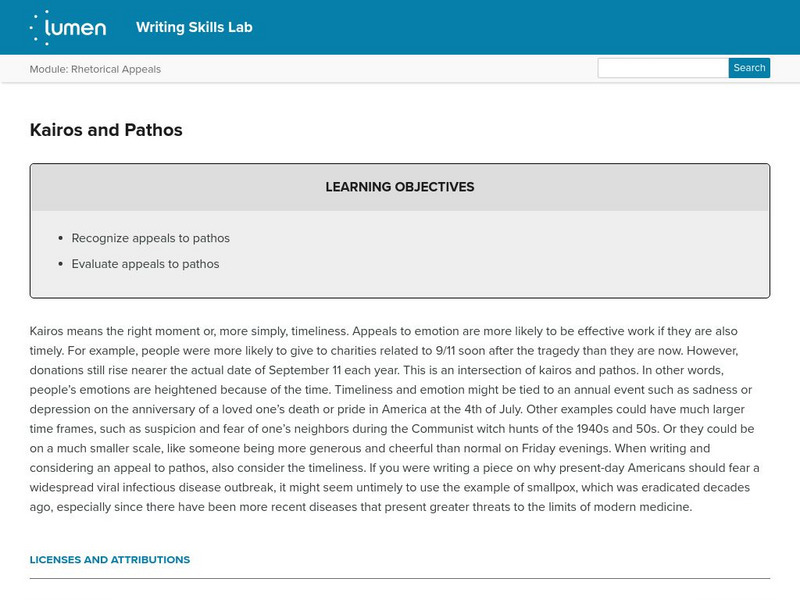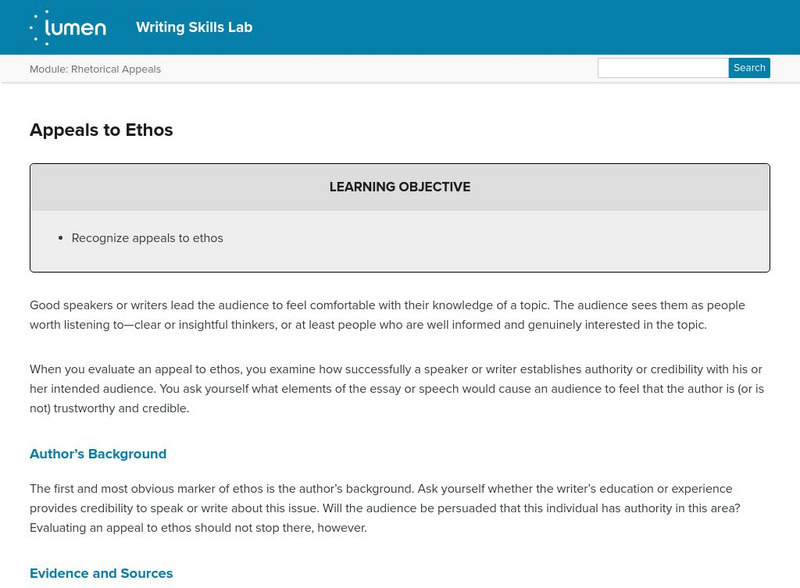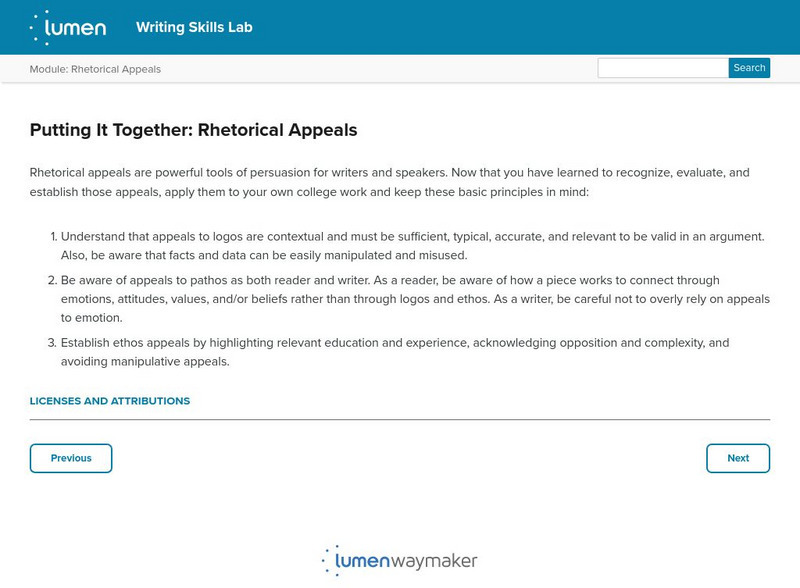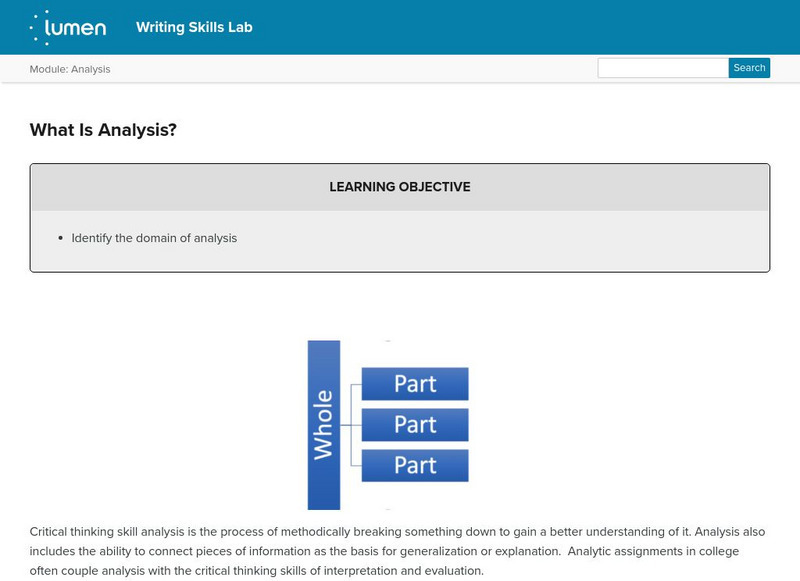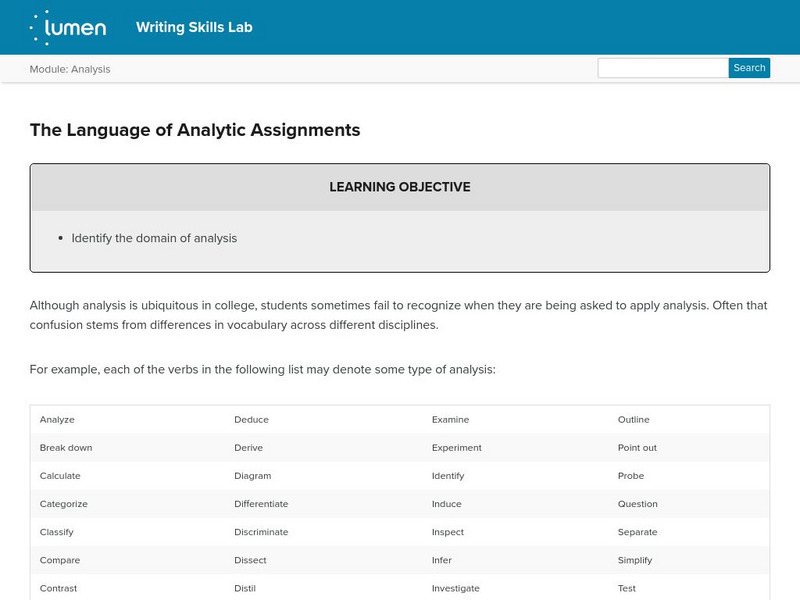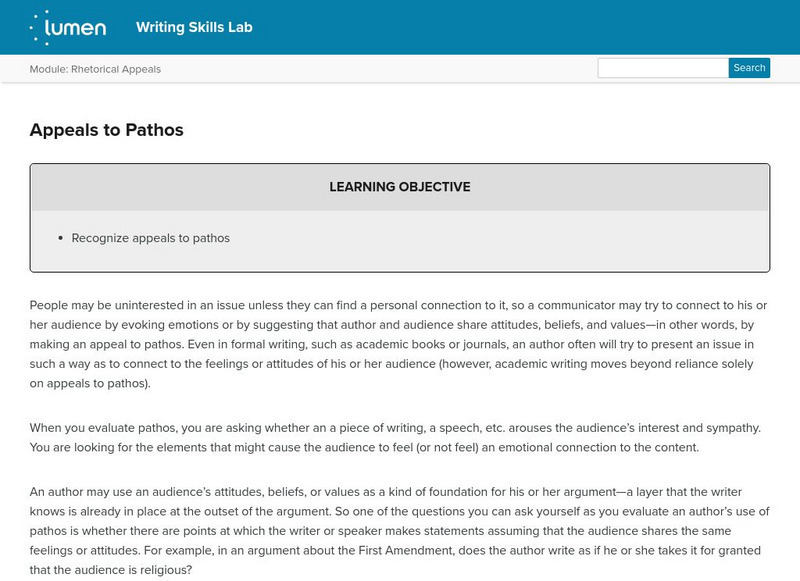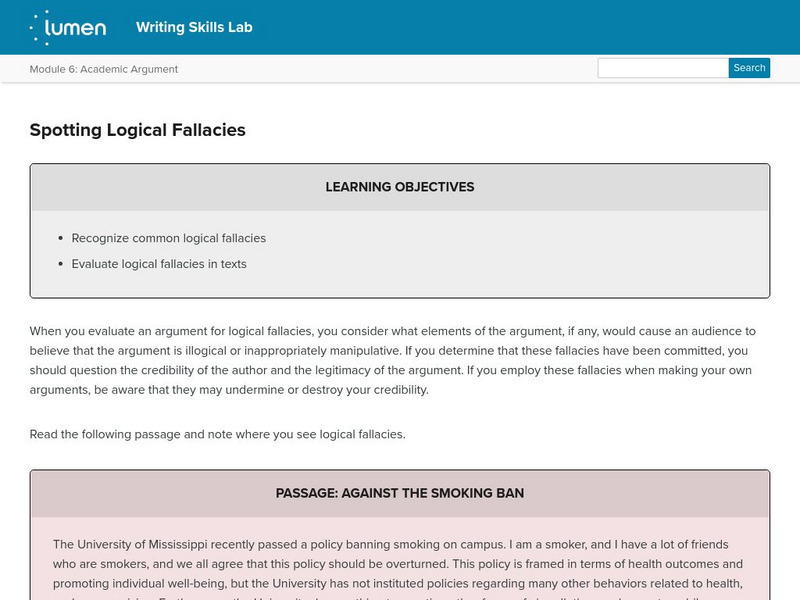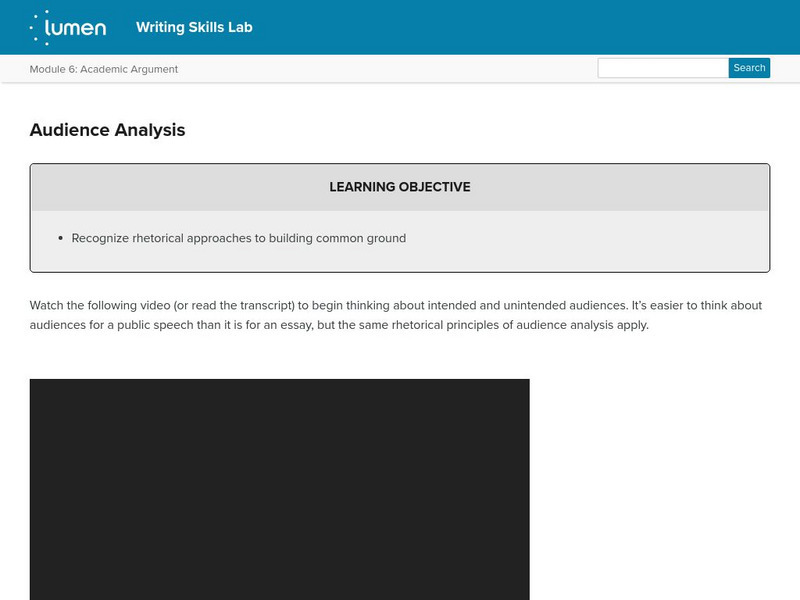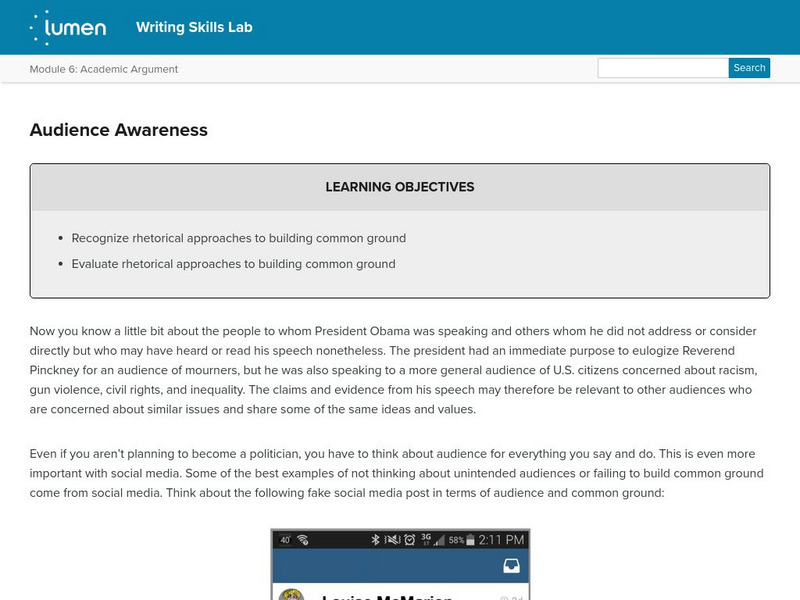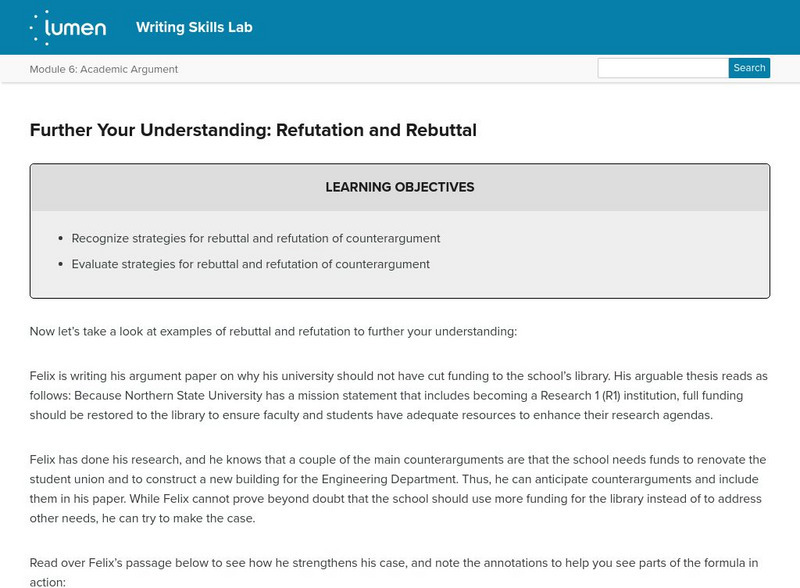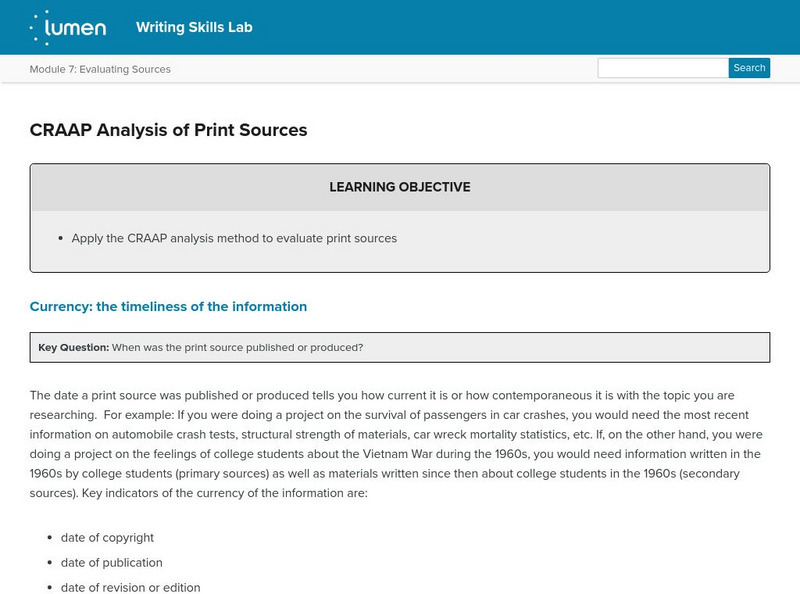Lumen Learning
Lumen: Rhetorical Appeals: The Star Criteria
This lesson focuses on the STAR Criteria for evaluating appeals to logos; it includes evaluating for Sufficiency, Typicality, Accuracy, and Relevance.
Lumen Learning
Lumen: Rhetorical Appeals: Kairos and Logos
This lesson focuses on the 4th logical appeal called Kairos, a time when conditions are right for the accomplishment of a crucial action; the opportune and decisive moment.
Lumen Learning
Lumen: Analysis: Analytic Thesis
This lesson plan focuses on the forming an analytic thesis statement that includes the how, why, and so what of the subject. It also discusses the need to let the thesis develop naturally and be sure that the main claim is reasoned.
Lumen Learning
Lumen: Rhetorical Appeals: Kairos and Pathos
This lesson focuses on appeals that use both Kairos and Pathos, appeals to emotion (pathos) are more likely to be effective work if they are also timely (kairos).
Lumen Learning
Lumen: Rhetorical Appeals: Appeals to Ethos
This lesson focuses on appeals to Ethos, When you evaluate an appeal to ethos, how successfully a speaker or writer establishes authority or credibility with his or her intended audience. You ask yourself what elements of the essay or...
Lumen Learning
Lumen: Putting It Together: Rhetorical Appeals
This lesson brings together the rhetorical appeals including Logos, Pathos, and Ethos and how to identify and apply each. Click the Next link for more information.
Lumen Learning
Lumen: Analysis: What Is Analysis?
This lesson focuses on analysis including defining analysis and listing the essential skills of analysis.
Lumen Learning
Lumen: Analysis: The Language of Analytic Assignments
This lesson focuses on understanding the language of assignments that indicate the need or analysis including a list of verbs that denote the need for analysis and assignments that ask you how the parts relate to the whole, how something...
Lumen Learning
Lumen: Analysis: Evidence
This lesson focuses on evidence in the analysis including being selective with evidence, being clear and explicit, and moving past obvious interpretations.
Lumen Learning
Lumen: Analysis: Rhetorical Analysis
This lesson plan focuses on defining rhetorical analysis and identifying and applying different types of analytic processes. It also provides a practice activity.
Lumen Learning
Lumen: Analysis: Process Analysis
This lesson focuses on process analysis including processes by people, machines, and nature. They can be classified as descriptive and prescriptive. It also includes a practice activity.
Lumen Learning
Lumen: Rhetorical Appeals: Appeals to Pathos
This lesson focuses on appeals to pathos; to connect to the audience by evoking emotions or by suggesting that author and audience share attitudes, beliefs, and values.
Lumen Learning
Lumen: Rhetorical Appeals: Manipulative Appeals to Pathos
This lesson focuses on the manipulative appeals to pathos, trying to unfairly play upon the audience's feelings and emotions through fallacious, misleading, or excessively emotional appeals.
Lumen Learning
Lumen: Using Sources: Bringing Sources Into the Conversation
This activity focuses on identifying the five components of the "source sandwich:" transition and introduction; a signal phrase; quotation, paraphrase, or summary; citation, and explanation of material's relevance. A practice exercise is...
Lumen Learning
Lumen: Writing Skills: Common Logical Fallacies
This lesson plan focuses on logical fallacies including defining them, discussing the different types of logical fallacies, and a practice activity.
Lumen Learning
Lumen: Writing Skills: Spotting Logical Fallacies
This instructional activity focuses on recognizing common logical fallacies and evaluating them in texts. It also provides a practice exercise.
Lumen Learning
Lumen: Writing Skills: Audience Analysis
This lesson plan focuses on audience analysis and recognizing rhetorical approaches to building common ground. A practice activity is provided.
Lumen Learning
Lumen: Writing Skills: Audience Awareness
This lesson focuses on audience awareness by recognizing and evaluating rhetorical approaches to building common ground. It also provides an example.
Lumen Learning
Lumen: Writing Skills: Tone, Language, and Appeal
This lesson plan focuses on using tone, language, and appeal to recognize and evaluate rhetorical approaches to building common ground. RI.9-10.4 word meanings/impact of choice
Lumen Learning
Lumen: Writing Skills: Further Your Understanding: Refutation and Rebuttal
This instructional activity focuses on examples of rebuttal and refutation to improve your understanding.
Lumen Learning
Lumen: Evaluating Sources: Scholarly vs. Non Scholarly Sources
This lesson plan focuses on types of sources including scholarly vs. non-scholarly sources and print, online, and multimedia.
Lumen Learning
Lumen: Evaluating Sources: Craap Analysis of Print Sources
This lesson focuses on evaluating print sources using CRAAP Analysis: Currency, relevance, authority, accuracy, and purpose. A practice exercise is included. W.9-10.8 Sources
Lumen Learning
Lumen: Evaluating Sources: Introduction to Online Sources
This is an introduction to evaluate methods to assess the quality of online sources. Click the next button on the right bottom.
Lumen Learning
Lumen: Evaluating Sources: Craap Analysis of Online Sources
This lesson focuses on evaluating online sources using the CRAAP Analysis: Currency, relevance, authority, accuracy, and purpose. A practice exercise is provided. SL.9-10.2 eval & integrate sources




